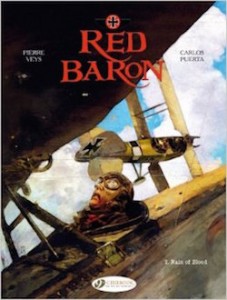Red Baron Book 2 Rain of Blood By Pierre Veys and Carlos Puerta Published by Cinebook
Warning: Review with major spoilers
Red Baron on first impression is an engrossing visual feast. And that first impression never goes away. The immediate standout feature of this series is the lush artwork by Carlos Puerta. At times, especially when detailing locations, the artwork showcases a photo-realistic level of detail. This eye for detail remains constant, even when rendering motion blur in action shots for heightened visual drama. It’s all the more remarkable as the graphic narrative is entirely free from sound effects, freeing up each panel from clutter and drawing in the eye with mesmerising sweeps, whether it be aerial shots over landscape, or a boxing match.
This book doesn’t entirely fail at reading like a slideshow, which is an easy pitfall for a sequence of panels that are pretty much frameable in their own right, but for the most part it’s not an issue. The ultra-thin gutters are precision separators of the panels, and add to filling the page, making each page a visual pool to drown in. It certainly helps that the books are being published in the larger European volume-size editions.
Which brings me to the second impression reading this series: the balance of picture and words. There’s a sparseness of words that, together with the freedom from sound-effects, lead to a very modern feel to the book (it’s an English translation of a 2013 comic, so it is actually a very modern comic, unlike many other Cinebook translations). The similarity however ends there. I tend to feel a bit empty after reading many ‘modern’ comics that seem tailored more for tablet readers than anything else. Here there is an intriguing story at work, using an economy of words that drives the artwork along – there is a sense of satisfaction after having read a volume.
And so we come to the second volume of the series. In Book 1: The Machine Gunners’ Ball, we are introduced to Manfred von Richthofen a.k.a. The Red Baron. This story could easily have been a straight historical war story and been none the poorer for it, but in this fictional account, we are introduced to a plausible fictional rationale for the Red Baron’s aerial success. It turns out that Manfred is in possession of a ‘supernatural’ sense, not unlike a mutant power, that acts like a Spider-sense and involves a low-grade telepathy as well. Manfred can sense danger, can read the intentions of an enemy pilot, and so can anticipate actions and counter them. This gives him a ‘supernatural’ advantage, not just in the air, but in any form of combat as we find out in the boxing match at the end of this volume. There’s certainly no attempt to turn this into a post-human manifesto – Manfred just accepts this as something to take advantage of in his own sadistic way.
In Book 2, Manfred struggles to learn the art of flying a plane, rather than being a gunner and relying upon other pilots as he had been forced to do until now. In this he is as human as the rest of us. The heart of the story is essentially Manfred’s will – he is a dashing figure with a sadistic streak, not unlike Jaime Lannister. The comic drives this paradox of brutality lying at the heart of civilisation using both the character study of the Red Baron and in visual cues throughout the story. A particularly striking example is the cut between a plane shot down by Manfred in a nosedived upright position, and an upright flute glass of champagne and bottle at the social gathering for the pilots after the event. Manfred has no illusions about it, and for him, there is no conflict. His reflection, after downing an enemy pilot in a particularly cold manner is “I have but one desire – to start all over again!”
At the start of Book 2, in an infirmary when being treated for a self-inflicted wound after a dog-fight, Manfred is informed that he has also received a bullet-wound from the enemy pilot, as his flight jacket has been shot up at the shoulder. Manfred remarks, hand on heart, “Hell…I didn’t feel a thing.” Significant, as the shoulder-wound wasn’t near his heart. He feels nothing like remorse for his enemies but does go on to feel the barbaric lust of combat. For him it’s the ‘indescribable pleasure’ of inflicting death upon people which he sums up eloquently in the opening scene of Book 1:
“For me there is nothing better in the world. War is a fabulous thing!”
There are two things to look forward to as the series progresses. First, how much more we learn about Manfred’s ‘supernatural’ power, and the cruel use he will put it to, and second, the wait for the Fokker tri-plane, the Red Baron’s signature aircraft. I’m drooling in anticipation over Carlos Puerta’s visual depictions of the classic Red Baron in action. The story so far is reading like the origin of the Red Baron, with marvellous visuals over Ostund, Champagne, Verdun and Luxembourg in Book 2 alone.
I am a sucker for fine European comics. And war stories. So Red Baron is another fine series to add to the already impressive output by Cinebooks.

 RSS - Posts
RSS - Posts
Recent Comments